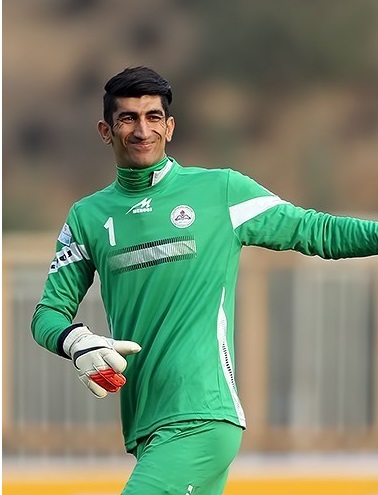Alireza Beiranvand’s goalkeeping skills are well known. He kept a clean sheet right through Iran’s qualifying campaign for the FIFA World Cup. But the unassuming 25-year-old overnight became a household name across the world after stopping a Cristiano Ronaldo penalty during his team’s final Group B game at Mordovia Arena on June 25.
Ronaldo, a contender for the Golden Boot at the moment, had scored for Portugal in the opening two matches in Russia. Beiranvand not only stopped a penalty from the Portuguese superstar during the match but also ensured Iran ended their World Cup with a respectable 1-1 draw against the European champions. In fact, Iran could have beaten Portugal and progressed into the knockouts had they managed to capitalise on a chance in the dying minutes.
The so-near-yet-so-far moment notwithstanding, Iranians can be proud of the way they played in Russia, while Beiranvand has his own personal reasons to beam about.
Football has a lot of stories of players coming up through a life of struggle before making it big. Even among them, Beiranvand’s story stands tall (pun intended) considering the amount of struggle he endured while facing the uncertainty of not even getting a chance to train.
He ran away from his family, a nomadic group, and slept on pavements, working various odd jobs including at a car wash, dress factory, and as a street cleaner, before getting his break at Naft-e-Tehran, where he rose through the ranks, entering the national team’s programme.
RUNNING AWAY FROM HOME
Beiranvand, the eldest son in a family that moved around the countryside in search of grassland for their sheep, started working at a young age. But he used to play football and Dal Paran (a game that involves throwing stones to long distances) with his friends whenever he got free time.
When he turned 12, Beiranvand’s family settled in Sarabias, and the youngster started training as a striker with a local team. He once replaced their injured goalkeeper for a match and made such an impression that he has stayed under the bar ever since.
Beiranvand’s father, however, felt football was a waste of time and wanted his son to work full time and become the family’s breadwinner. There were times when he would tear apart Beiranvand’s gloves and jerseys, forcing the youngster to play with bare hands.
Beiranvand, at this point, had made up his mind that his future lay in football. He borrowed money from a relative and left for Tehran, where his struggle began, albeit not on the football field.
HOMELESS ‘BEGGAR’
In Tehran, with no money, Beiranvand slept on pavements near the Azadi Tower. He used to train on trial basis with a local side every day, sleeping by the club’s door at night. The coach at the club, Hossein Feiz, told Beiranvand he would let him train in return for 200,000 Toman (around Rs 3,000), but he couldn’t afford that.
“I slept by the club’s door and when I got up in the morning I noticed the coins that people had dropped for me,” Beiranvand told The Guardian. “They had thought I was a beggar! Well, I had a delicious breakfast for the first time in a long while.”
He finally got an opportunity to play without paying, and, simultaneously, the young ’keeper started working in a dress factory owned by the father of a teammate. He could also sleep at the factory.
He kept changing jobs, from working at car wash, a pizza shop, and as a street cleaner before meeting a Naft-e-Tehran coach and moving in there. After a bit of uncertainty, Naft’s Under-23 coach signed him on and the youngster has never looked back.
He was selected for Iran’s under-23 side, and then became Naft’s first-team goalkeeper. His ability to throw stones to long distances during the Dal Paran games gave him a unique skill — he could throw the ball to great distances (60-plus metres with ease). His 70-metre assist during a match against Tractor Sazi made him famous.
Now, stopping Ronaldo from the penalty spot has taken that fame to another level, and could possibly open up opportunity for the youngster in Europe, following the footsteps of some Iranian greats including Ali Daei, whose car he once cleaned while working at the car wash.
Beiranvand refused to talk to Daei that time, when he could have easily asked the former Bayern Munich player for help in his footballing career. The goalkeeper believed it was up to him to find his own path in football. The proud Iranian seems to have managed doing just that!
First published in Newsclick.





